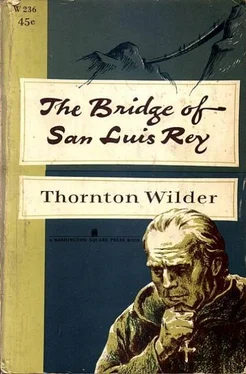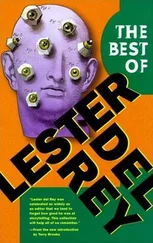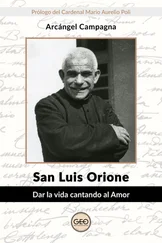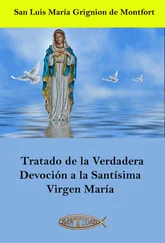Uncle Pio was made anxious by Camila’s invitation from the Palace. He would have much preferred that she continue with her little vulgarian love-affairs in the theatrical warehouse. But when he saw that her art was gaining a new finish he was well content. He would sit in the back of the theatre, rolling about in his seat for sheer joy and amusement, watching the Perichole intimate to the audience that she frequented the great world about whom the dramatists wrote. She had a new way of fingering a wineglass, of exchanging an adieu, a new way of entering a door that told everything. To Uncle Pio nothing else mattered. What was there in the world more lovely than a beautiful woman doing justice to a Spanish masterpiece?—a performance (he asks you), packed with observation, in which the very spacing of the words revealed a comment on life and on the text—delivered by a beautiful voice—illustrated by a faultless carriage, considerable personal beauty and irresistible charm. “We are almost ready to take this marvel to Spain,” he would murmur to himself. After the performance he would go around to her dressing-room and say “Very good!” But before taking his leave he would manage to ask her where, in the name of the eleven thousand virgins of Cologne, she had acquired that affected way of saying Excelencia .
After a time the Viceroy asked the Perichole whether it would amuse her to invite a few discreet guests to their midnight suppers, and he asked her whether she would like to meet the Archbishop. Camila was delighted. The Archbishop was delighted. On the eve of their first meeting he sent the actress an emerald pendant as big as a playing card.
There was something in Lima that was wrapped up in yards of violet satin from which protruded a great dropsical head and two fat pearly hands; and that was its archbishop. Between the rolls of flesh that surrounded them looked out two black eyes speaking discomfort, kindliness and wit. A Curious and eager soul was imprisoned in all this lard, but by dint of never refusing himself a pheasant or a goose or his daily procession of Roman wines, he was his own bitter jailer. He loved his cathedral; he loved his duties; he was very devout. Some days he regarded his bulk ruefully; but the distress of remorse was less poignant than the distress of fasting and he was presently found deliberating over the secret messages that a certain roast sends to the certain salad that will follow it. And to punish himself he led an exemplary life in every other respect.
He had read all the literature of antiquity and forgotten all about it except a general aroma of charm and disillusion. He had been learned in the Fathers and the Councils and forgotten all about them save a floating impression of dissensions that had no application to Peru. He had read all the libertine masterpieces of Italy and France and reread them annually; even in the torments of the stone (happily dissolved by drinking the water from the springs of Santa María de Cluxambuqua), he could find nothing more nourishing than the anecdotes of Brantôme and the divine Aretino.
The Archbishop knew that most of the priests of Peru were scoundrels. It required all his delicate Epicurean education to prevent his doing something about it; he had to repeat over to himself his favourite notions: that the injustice and unhappiness in the world is a constant; that the theory of progress is a delusion; that the poor, never having known happiness, are insensible to misfortune. Like all the rich he could not bring himself to believe that the poor (look at their houses, look at their clothes) could really suffer. Like all the cultivated he believed that only the widely-read could be said to know that they were unhappy. On one occasion, the iniquities in his see having been called to his notice, he almost did something about it. He had just heard that it was becoming a rule in Peru for priests to exact two measures of meal for a fairly good absolution, and five measures, for a really effective one. He trembled with indignation; he roared to his secretary and bidding him bring up his writing materials, announced that he was going to dictate an overwhelming message to his shepherds. But there was no ink left in the inkwell; there was no ink left in the next room; there was no ink to be found in the whole palace. This state of things in his household so upset the good man that he fell ill of the combined rages and learned to guard himself against indignations.
The addition of the Archbishop to the suppers was so successful that Don Andrés began to think of new names. He had grown increasingly dependent upon Uncle Pio, but waited until Camila should propose his inclusion of her own accord. And in due time Uncle Pio brought with him that courser of the seas, the Captain Alvarado. Generally the reunion had been several hours under way before Camila was able to join them after her performance at the theatre. She would arrive towards one o’clock, radiant and bejewelled and very tired. The four men received her as they would a great queen. For an hour or so she would carry the conversation, but gradually reclining more and more against Don Andrés’ shoulder she would follow the talk as it flitted from one humorous lined face to the other. All night they talked, secretly comforting their hearts that longed always for Spain and telling themselves that such a symposium was after the manner of the high Spanish soul. They talked about ghosts and second-sight, and about the earth before man appeared upon it and about the possibility of the planets striking against one another; about whether the soul can be seen, like a dove, fluttering away at the moment of death; they wondered whether at the second coming of Christ to Jerusalem, Peru would be long in receiving the news. They talked until the sun rose, about wars and kings, about poets and scholars, and about strange countries. Each one poured into the conversation his store of wise sad anecdotes and his dry regret about the race of men. The flood of golden light struck across the Andes and entering the great window fell upon the piles of fruit, the stained brocade upon the table, and the sweet thoughtful forehead of the Perichole as she lay sleeping against the sleeve of her protector. There would ensue a long pause, no one wishing to make the first move to go, and the glances of them all would rest upon this strange beautiful bird who lived among them. But Uncle Pio’s glance had been upon her all night, a quick glance from his black eyes, full of tenderness and anxiety, resting on the great secret and reason of his life.
But Uncle Pio never ceased watching Camila. He divided the inhabitants of this world into two groups, into those who had loved and those who had not. It was a horrible aristocracy, apparently, for those who had no capacity for love (or rather for suffering in love) could not be said to be alive and certainly would not live again after their death. They were a kind of straw population, filling the world with their meaningless laughter and tears and chatter and disappearing still lovable and vain into thin air. For this distinction he cultivated his own definition of love that was like no other and that had gathered all its bitterness and pride from his odd life. He regarded love as a sort of cruel malady through which the elect are required to pass in their late youth and from which they emerge, pale and wrung, but ready for the business of living. There was (he believed) a great repertory of errors mercifully impossible to human beings who had recovered from this illness. Unfortunately there remained to them a host of failings, but at least (from among many illustrations) they never mistook a protracted amiability for the whole conduct of life, they never again regarded any human being, from a prince to a servant, as a mechanical object. Uncle Pio never ceased watching Camila because it seemed to him that she had never undergone this initiation. In the months that followed her introduction to the Viceroy he held his breath and waited. He held his breath for years. Camila bore the Viceroy three children, yet remained the same. He knew that the first sign of her entrance into the true possession of the world would be the mastery of certain effects in her acting. There were certain passages in the plays that she would compass some day, simply, easily, and with secret joy, because they alluded to the new rich wisdom of her heart; but her treatment of such passages became more and more cursory, not to say embarrassed. He presently saw that she had tired of Don Andrés and had returned to a series of furtive love-affairs with the actors and matadors and merchants of the town.
Читать дальше












